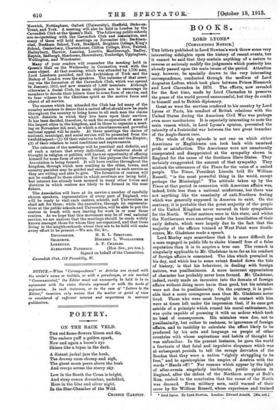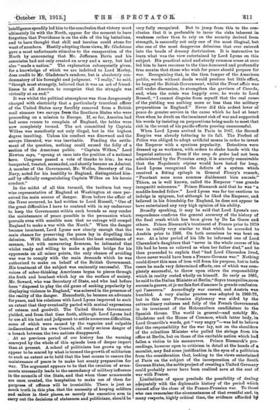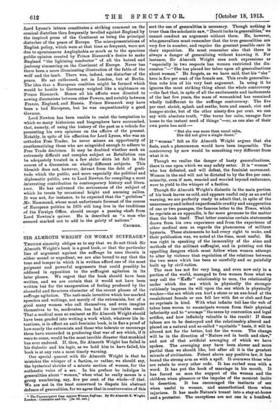BOOKS.
LORD LYONS.* [CoNcLunnto NcericE.]
THE letters published in Lord Newton's work throw some very interesting sidelights upon the history of recent events, but it cannot be said that they contain anything of a nature to reverse or seriously modify the judgments which posterity has already passed upon the main issues of the period. Attention may, however, be specially drawn to the very interesting correspondence, conducted through the medium of Lord Augustus Loftus, which took place between Prince Bismarck and Lord Clarendon in 1870. The efforts, now revealed: for the first time, made by Lord Clarendon to preserve the peace of the world proved unsuccessful, but they do credit to himself and to British diplomacy.
Great as were the services rendered to his country by Lord Lyons at Paris, his conduct of British relations with the United States during the American Civil War was perhaps even more meritorious. It is especially interesting to note the main reason which, in Lord Lyons's opinion, prevented the calamity of a fratricidal war between the two great branches of the Anglo-Saxon race.
The whole of this episode is not one on which either Americans or Englishmen can look back with unmixed pride or satisfaction. The Americans were not unnaturally exasperated and disappointed at the sympathy shown in England for the cause of the Southern Slave States. They certainly exaggerated the amount of that sympathy. They mistook the utterances of the Times for the voice of a united people. The Times, President Lincoln told Sir William Russell, "is the most powerful thing in the world, except perhaps the Mississippi." The attitude taken up by the Times at that period in connexion with American affairs was, indeed, little less than a national misfortune, but there was not anything like the unanimity of anti-Northern feeling which was generally supposed in America to exist. On the contrary, it is probable that the great majority of the people of the United Kingdom never wavered in their sympathies for the North. Whilst matters were in this state, and whilst the Northerners were smarting under the humiliation of their early defeats, which were largely due to the fact that the majority of the officers trained at West Point were South- erners, Mr. Gladstone made a speech.
Lord Morley says somewhere that it is more difficult for a man engaged in public life to shake himself free of a false reputation than it is to acquire a true one. The remark is singularly applicable to Mr. Gladstone in so far as his conduct of foreign affairs is concerned. The idea which prevailed in his day, and which has to some extent floated down the tide of history, is that his behaviour, in dealing with foreign nations, was pusillanimous. A more incorrect appreciation of character has probably never been formed. Mr. Gladstone, indeed, rarely made an incursion into the domain of foreign affairs without doing more harm than good, but his mistakes were not due to pusillanimity. On the contrary, it is prob- able that a more courageous man than Mr. Gladstone never lived. Those who were most brought in contact with him were at times left under the impression that, if he once got astride of a principle which roused his moral enthusiasm, he was quite capable of pursuing it with an ardour which took no heed of consequences. His mistakes were due, not to pusillanimity, but rather to rashness, to ignorance of foreign affairs, and to inability- to calculate • the effect likely to be produced by his acts and language on people of other. countries with whose aspirations and habits of thought he was unfamiliar. In the present instance, he gave the world a foretaste of that fatal and impulsive eloquence which was at subsequent periods to tell the savage dervishes of the Soudan that they were a nation "rightly struggling to be
free," and to apostrophize the empire of Austria with the words "Hands off!" For reasons which appear by the light of after-events singularly inadequate, public opinion in England, after the defeat of the Northern army at Bull's Run, rushed to the conclusion that the cause- of the North was doomed. Even military men, until warned of their error by Sir William Russell, whose experience and trained • Lord Lyons. By Lord Newton, London: Edward Arnold, [Ws. net.] - - 'intelligence speedily led him to the conclusion that victory must ultimately lie with the North, appear for the moment to have forgotten that Providence is on the side of the big battalions, and to have thought that skill and heroism could atone for want of numbers. Hastily adopting these views, Mr. Gladstone gave a most unfortunate stimulus to the exasperation of the North by announcing that Mr. Jefferson Davis and his associates had not only created an army and a navy, but had also "made a nation." The explanation subsequently given, for a knowledge of which we are indebted to Lord Morley, does credit to Mr. Gladstone's candour, but is absolutely con- demnatory of his foresight and judgment. "I really," be said, "though most strangely, believed that it was an act of friend- liness to all America to recognize that the struggle was virtually at an end."
It was whilst the political atmosphere was thus dangerously charged with electricity that a particularly truculent officer of the United States navy forcibly removed from a British mail steamer two envoys from the Southern States who were proceeding on a mission to Europe. If, so far, America had had some reason to complain of England, the tables were now completely turned. The act committed by Captain Wilkes was manifestly not only illegal, but in the highest degree insulting. Unless his conduct was disowned and the envoys liberated, war was inevitable. Pending the settle- ment of the question, nothing could exceed the folly of a section of the American public. "Captain Wilkes," Lord Newton says, "sprang at once into the position of a national hero. Congress passed a vote of thanks to him ; he was banqueted, toasted, serenaded, and shortly became an Admiral. A member of the Government, Mr. Welles, Secretary of the Navy, noted for his hostility to England, distinguished him- self by officially congratulating Captain Wilkes on his heroic conduct."
In the midst of all this turmoil, the taciturn but very wise representative of England at Washington at once per- ceived the main source of danger. Even before the affair of the Trent occurred, he had written to Lord Russell, "One of the great difficulties I have to contend with in my endeavour to keep the Government within such bounds as may render the maintenance of peace -possible is the persuasion which prevails even with sensible men that no outrage will compel England to make a war with the North." When the danger became imminent, Lord Lyons saw clearly enough that the main chance for preserving the peace lay in dispelling this delusion. With infinite tact, without the least semblance of menace, but with unwavering firmness, he intimated that whilst ready and willing to make a golden bridge for his opponents on all minor points, the only chance of avoiding war was to comply with the main demands which he was authorized to make on behalf of the British Government. His treatment of the subject was eminently successful. The voices of sober-thinking Americans began to pierce through the froth and bombast which lay on the surface of society. .Mr. Seward, who was Secretary of State, and who had before -been "disposed to play the old game of seeking popularity by displaying violence to England," was sobered in the presence of the reality of the danger. Henceforth, he became an advocate for peace, and his relations with Lord Lyons improved to such an extent that they eventually parted with mutual expressions of esteem and goodwill. The United States Government yielded, and from that time forth, although Lord Lyons had to use all his tact and judgment to settle numerous difficulties, some of which were caused by the vagaries and culpable indiscretions of his own Consuls, all really serious danger of .a breach between the two nations disappeared.
. At no previous period of our history has the warning conveyed by the whole of this episode been of deeper import than at present. A school of politicians has grown up who appear to be scared by what is termed the growth of militarism to such an extent as to hold that the best means to ensure the maintenance of peace is to make but scanty preparation for war. The argument appears to be that the creation of arma- ments necessarily leads to the ascendancy of military influence in the councils of the State, and that when those armaments are once created, the temptation to make use of them for purposes of offence will be irresistible. There is just so much truth in, this plea that the necessity of keeping soldiers and sailors in their places, as merely the executive arm to carry out the decisions of statesmen and politicians, should be very fully recognized. But to jump from this to the con- clusion that it is preferable to incur the risks inherent in weakness rather than to rely on the security derived from strength, is assuredly not only one of the most illogical, but also one of the most dangerous delusions that ever entered into the heads of dreamy doctrinaires. It is instructive to. learn what was the view entertained by Lord Lyons on this subject. His practical mind and sturdy common sense at once led him to have recourse to the time-honoured and profoundly true maxim that those who wish for peace should prepare for' war. Recognizing that, in the then temper of the American public, words without deeds would produce but little effect,, he begged the British Government, whilst the Trent affair was still under discussion, to strengthen the garrison of Canada, and, when the crisis was happily over, he wrote to Lord Russell, "I cannot disguise from myself that the real cause of the yielding was nothing more or less than the military preparations in England." Never did this ardent lover of peace do greater service in the cause which he had at heart than when he dwelt on the imminent risk of war and supported! his words by insisting on preparations being made to meet that risk in the event of his pacific efforts proving unsuccessful.
When Lord Lyons arrived in Paris in 1S67, the Second
Empire was already tottering to its fall. The Prefect of Police was obliged to adopt artificial means in order to invest the Emperor with a spurious popularity. Detectives were dressed up as workmen, with orders to shake hands with the autocrat. Even if the coup de gnice had not been administered by the Prussian army, it is scarcely conceivable that the Napoleonic regime would have lasted for long. Lord Lyons recognized the defects of a system which received a fitting epitaph in General Fleury's remark, " Pourtant nous nous sommes diablement hien amuses?' Thiers, as is well known, called the Emperor "flue grande incapacite meconnue." Prince Bismarck said that he was "a. muddle-headed fellow." Lord Lyons was far too cautions to. indulge in epigram, but although he liked the Emperor, and believed in his friendship for England, he does not appear to. have entertained any very high opinion of his ability.
Broadly speaking, it may be said that Lord Lyons's cor-
respondence confirms the general accuracy of the history of the final crash which has been given by De La Gorce and others. Prince Bismarck's treatment of France prior to 1870. was in reality very similar to that which he accorded to. Austria prior to 1866. On both occasions be was bent on war. At a later period of his life he informed one of Lord. Clarendon's daughters that "never in the whole course of bin life had be been so relieved as when her father died," and he- then proceeded to explain that "had Lord Clarendon lived, there never would have been a Franco-German war." Nothing could divert this man of iron will from his purpose, but in both cases he made very determined efforts, one of which was com- pletely successful, to throw upon others the responsibility which in reality rested wholly on himself. So early as 1865, he said to the Italian Minister at Berlin," Soyez tranquilles,noun aurons la guerre, et je me fais fort d'amener la grande confusion qui l'assurera." Accordingly war ensued, and Austria wan humbled. A very similar process was adopted in 1869-70, but in this case Prussian diplomacy was aided by the- extraordinary rashness and folly of the French Government. in its treatment of the Hohenzollern candidature to the Spanish throne. The world in general—and notably Mr. Gladstone and the House of Common, which latter body, in Lord Granville's words, got "very angry "—was led to believe that the responsibility for the war lay, not on the shoulders of the relentless Minister who pulled the strings from his office at Berlin, but on those of the excitable nation which had fallen a victim to his raanceuvres. Prince Bismarck's pro- ceedings, however open to criticism in detail at the hands of a moralist, may find some justification in the eyes of a politician from the consideration that, looking to the views entertained at Paris on the subject of the incorporation of the South German States, the noble project of creating a United Germany could probably never have been realized save at the cost of war with France.
Limitations of space preclude the possibility of dealing adequately with the diplomatic history of the period which ensued after the close of the Franco-Prussian war. To those who can remembenthe circumstances of that eventful and, in many teepees, highly critical time, the evidence afforded by Lord Lyons's letters constitutes a striking comment on the comical diatribes then frequently levelled against England by the inspired press of the Continent as being the principal sdisturber of the peace of Europe. The misrepresentations of English policy, which were at that time so frequent, were not due to spontaneous Anglophobia so much as to the spurious public opinion created by Prince Bismarck's desire to make England "the lightning conductor" of all the hatred and jealousy simmering on the Continent of Europe. Never has there been a more illuminating illustration of the fable of the wolf and the lamb. There was, indeed, one disturber of the peace. He sat enthroned, not in London, but at Berlin. The idea that a European coalition might be formed which would be hostile to Germany weighed like a nightmare on Prince Bismarck. Hence all his efforts were directed to sowing dissensions between other Powers, and notably between France, England, and Russia. Prince Bismarck may have been a bad European, but he was unquestionably a good 'German.
Lord Newton has been unable to resist the temptation to -which so many historians and biographers have succumbed, that, namely, of using the history of the past as a vehicle for presenting his own opinions on the affairs of the present. Notably, in spite of his affection for Lord Lyons, who was an orthodox Free Trader, he never misses an opportunity of anathematizing those who are misguided enough to adhere to Free Trade doctrines. It may be doubted whether such an extremely difficult and complex subject as Retaliation can be adequately treated in a few °biter dicta let fall in the course of a discussion on wholly different subjects. This .blemish does not, however, detract from the debt of grati- tude which the public, and more especially the political and diplomatic public, owe to Lord Newton for compiling a most -interesting contribution to contemporary history and litera- lure. He has enlivened the seriousness of the subject of which he treats by occasional bright and amusing sallies. It was not, for instance, to be expected that the "guileless" .Mr. Hammond, whose most unfortunate forecast of the course of European politics in 1870 will long live in the traditions .of the Foreign Office, should escape a passing abaft from Lord Newton's quiver. He is described as "a man who sfeemed marked out to add to the gaiety of nations."
CROMER.
















































 Previous page
Previous page